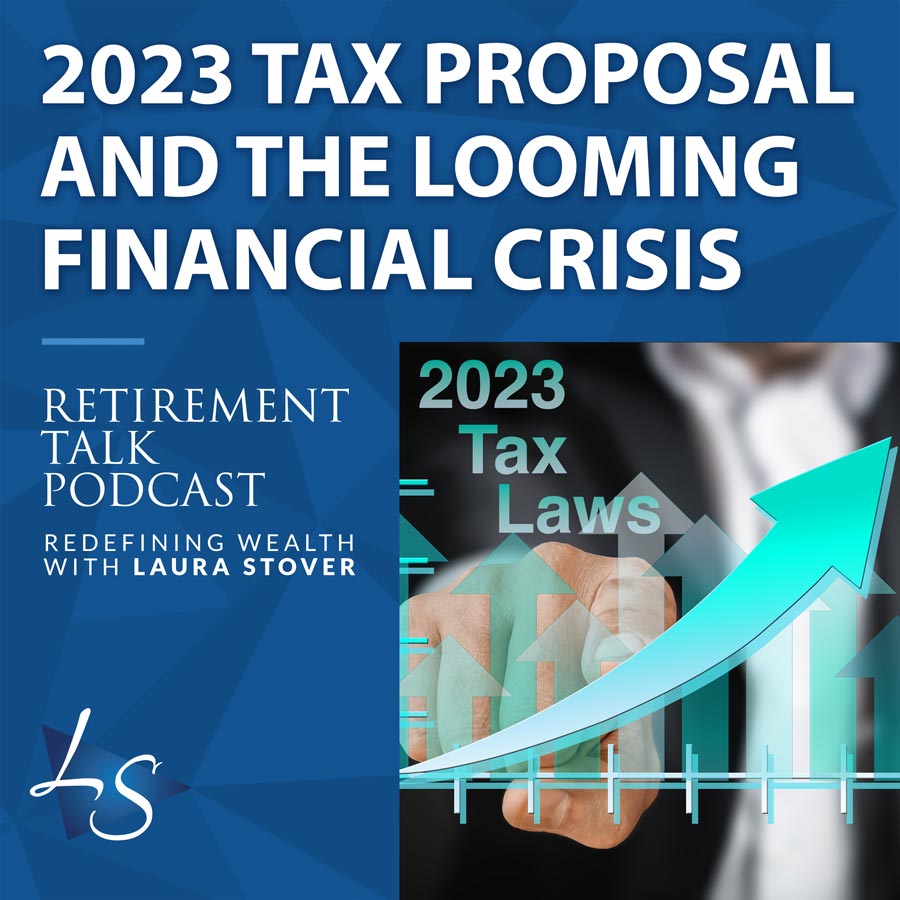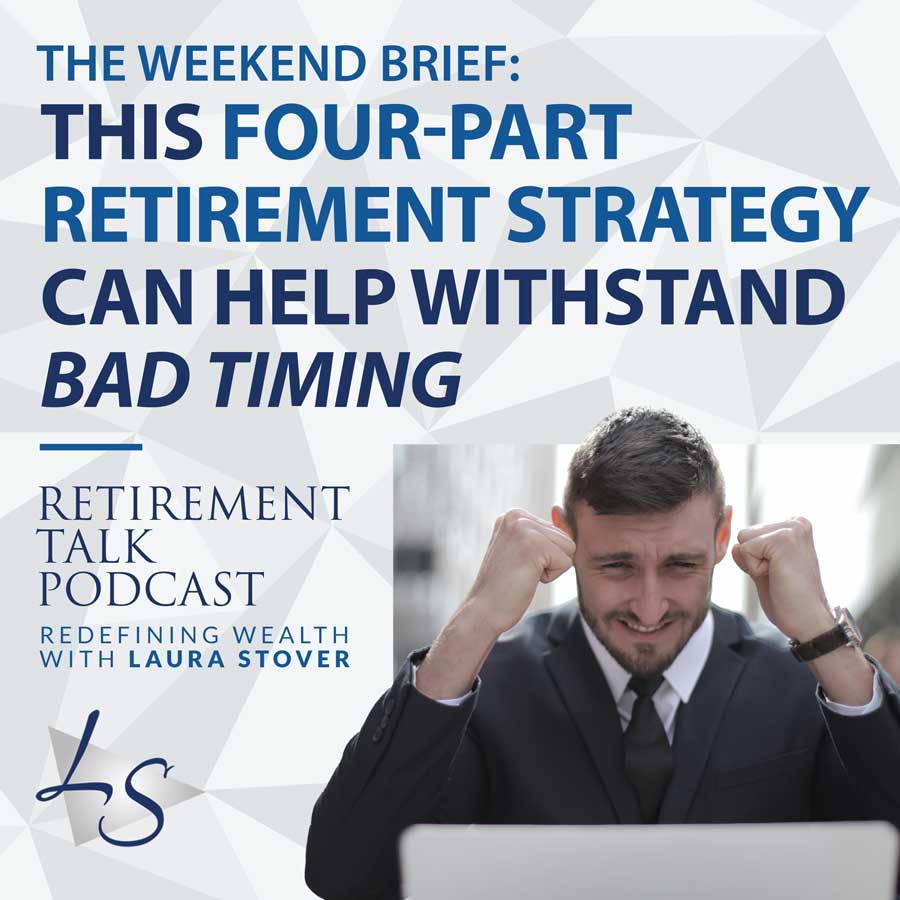Could Joe Biden’s new tax proposal impact you and your retirement plan? On today’s episode, we’re breaking down Joe Biden’s proposal of a 20% billionaire tax, the looming financial crisis, and what you can do to protect yourself and your future against rising taxes. The billionaire tax proposal is expected to reduce the deficit over the next decade. However, this is coming after a $3.9 trillion dollar spending bill, meaning the proposed reduction from the billionaire tax would only be a tiny percentage.
Deficit spending continues to rise but capitalism proves to be the best way to move forward and pay off our national debt. While this proposal is called the “billionaire tax” it would impact anyone with more than 100 million directly. They will pay a minimum of 20% each year on their capital gains. Yet, it’s quite possible average Americans could also feel these effects when it comes to their assets on a granule level.
Along with rising interest rates this proposal could be alarming for many reasons. Your asset value is probably growing, meaning you’ll likely be subject to paying more taxes. Gains in the stock market have provided for countless retirees, improving their quality of life and protecting longevity in their plans. This proposal could incentivize these investors and threatened many Americans’ retirement plans. Therefore, we need to insulate ourselves regardless of what the government does moving forward. Join us today as we discuss these issues and the solutions that can mitigate these possible impacts on your financial future.
Rate & Review and Subscribe to the Podcast:
https://podcasts.apple.com/us/podcast/retirement-talk-podcast-with-laura-stover/id571347188
Links
Schedule a Review: https://redefiningwealth.info/schedule/
Timestamps (show notes):
0:13 – Welcome to the 100th Episode!
3:39 – Will this proposal lower the deficit?
6:17 – Most millionaires are self-made
10:10 – How would this bill work?
15:48 – How inflation impacts your assets and taxes
19:26 – There’s always a cost-basis factor
25:04 – What can you do now to insulate yourself?
29:37 – Having the right balance in tax buckets
32:33 – Recommendation of David M Walker’s Book
Listen & Subscribe
Review the Transcript:
Ron Stutz:
Welcome to Retirement Talk, the redefining wealth show. Your source for financial information specifically for pre-retirees and retirees. We’re here each and every week to help you better navigate during these economic times. We’re here to discuss thoughts and ideas in the field of finance and retirement, as well as discuss trending topics that could impact your bottom line. We will break it all down. These discussions can help you make better informed decisions so you can make better financial choices and live the lifestyle you imagine for retirement.
Ron Stutz:
Laura Stover is a registered financial consultant and CEO of LS Wealth Management, as well as founder and owner of LS Tax, a consulting firm. She’s been featured in Forbes, CNBC and the Wall Street Journal. I’m Rod Stutz. Our topic of discussion for today is President Joe Biden to propose a new 20% minimum billionaire tax. We talk all about it along with our looming fiscal crisis and some strategies you can implement to better insulate yourself from future higher taxes. All here on Retirement Talk. Now here’s your host, Laura Stover, along with co-host for this week, certified financial planner, Michael Whalen.
Laura Stover:
Hello, hello, hello. As part of the 2023 budget proposal on the table is the big billionaire minimum income tax potentially being proposed. We’re going to discuss this and a lot more in today’s Retirement Talk and we’re here each and every Friday with the show to bring you the latest news topics that you need to know about in order to prepare for retirement, or maybe you’re already retired. And I couldn’t be happier, I have with me again, my esteemed co-host, certified financial planner, Michael Whalen. Hello, Michael.
Michael Whalen:
Hey Laura. Great to be here today. Great show. I know this is going to be a topic that a lot of people are going to have an interest in and it’s very newsworthy. So, super excited about going through this with you.
Laura Stover:
Well, we’ll without further ado hop right in, but I must take a pause and thank everyone who’s listening to the show. This is the 100th, woo-hoo, 100th episode of Retirement Talk, the redefining wealth show. And I know most of you listening, you’ve actually contacted us. You’ve scheduled that 15 minute strategy session. We’re only on the hundredth episode. It seems longer Mike, but people are listening. I know last I looked, I don’t look at the numbers every week. We’re over 63,000 downloads and growing exponentially. So I appreciate the loyal listeners. Those of you that email or reach out, thank you. We are here for you. I know you’re benefiting from the information.
Laura Stover:
So without further ado, it has been proposed Michael, and I know you love… The last two episodes we discussed estate planning, part one and part two. So go back and check out episode 98 and 99. If you’re just listening this week, if you missed a show, those were really good. All about estate planning. Now the latest news, not so late, it’s still a proposal, but there’s a proposal for a billionaire minimum income tax. Now that sounds good on the surface. Let Caesar come out and tax those rich billionaires so that we can all live better.
Laura Stover:
Well, I did a little data research. I like to look at all sides of this and we do try to stay neutral on the show, but if our opinions come through, it’s my show. So we’re going to say what we believe and what we think is the right financial planning mechanism. So if you’re going to have an opinion, I believe back that opinion up and why is it beneficial? That’s really a healthy debate when it comes to these things. So it’s fun, Mike, it’s fun to kind of talk about this. But it would assess a 20% minimum tax rate on US households worth more than a hundred million.
Laura Stover:
Now, how does a hundred million become a billion? That part of it I’m still a little confused. Over half the revenue though would come from those worth more than 1 billion. That’s with a B. This minimum tax would make sure that the wealthiest Americans no longer pay a tax rate lower than teachers and firefighters the document said. So the proposed levy is expected to reduce the deficit. That sounds good, right Mike? 360 billion over the next decade. We’ll see what Mr. Whalen has to say about… I mean, we’re reducing the deficit, Michael, according to the document. Go ahead, what you want to say about that?
Michael Whalen:
We sit there and we’ve talked in our earlier episodes about approving a $3.9 trillion deficit spending bill. And now we’re coming back in and wanting to levy attacks that they’re talking about over a 10 year period is going to give us $360 billion back. Now, when we look at a billion to a trillion, it takes a thousand billions to make a trillion. So when we’re looking at this over a 10 year period, and these are very big numbers, but we can’t get lost in the number of zeros at the end of the number. That $360 billion against a $3.9 trillion spending bill that we just released is like taking a penny and cutting a little crevice off of it and saying we’re making an impact.
Laura Stover:
Point well taken. So that’s why. If you’ve got an opinion, you back it up. That’s what we’re looking for here on the show. So some interesting statistics. This might be kind of with those nuggets. The US has 724 billionaires. That was the most recent data that I could find. 724. That’s not that many people. At the end of 2020, the world, the entire world, has 56.1 million millionaires. The US at the end of 2020 had 20.2 millionaires. That’s a large percentage of the world’s millionaires, that 20.2 are in the US, US citizens. Worldwide there are only 2,755 billionaires. That’s worldwide. And the 2019 data was some of the most recent that I could find. It says about 50% of billionaires are between the age of 50 to 70. 88% of all millionaires, not talking billionaires, but 88% of all millionaires are self-made according to statistics.
Laura Stover:
I thought that is a strong argument for the big C word. And you know what? [inaudible 00:07:34] about capitalism. Where else can you come from nothing? How many stories have we heard all of our life, even Oprah Winfrey. Tremendous stories of people coming from poverty. Elvis Presley. There’s endless stories. Even Warren Buffet didn’t make the bulk of his wealth until he was past the age of 55 I believe. A wealthy household is already paying 20% on their full income and they won’t pay an additional tax under the proposal. And if they pay less than 20%, they’ll owe a top-up payment to meet the new minimum.
Michael Whalen:
Well, even look at Bill Gates and Jeff Bezos. Bill Gates created Microsoft out of a garage. Jeff Bezos borrowed money from his parents. They have now created two of the largest corporations in the world that employees, thousands of employees, tens of thousands of employees across the country creating a tax base to the federal government, but it was created through capitalism. And that’s not something that you cannot tax the rich and meet all of the debt obligations. We don’t have an earnings problem in this country, we have a spending problem. And we have a problem where we have deficit spending that it continues to rise that Laura, in our previous episodes, we’ve talked about in 2030 of what that national debt is going to look like. We’ve sold our national debt. That 25% of our national debt is currently owned by China and Japan.
Michael Whalen:
And I think everybody that is listening to the show should really let that resonate with them. That countries that may not value the same beliefs that we have in this country owns 25% of our national debt. A collapse of our US dollar could easily be created by those individuals that do not value human life in their country. And if they decided that they wanted to sell off or sell at a discount rate drive down the American dollar, we’ve given them access to that by them being able to buy it. So capitalism is the only way that we’re going to continue to move forward and create the wealth needed to pay off the national debt.
Laura Stover:
Well, how the tax will work, at least from the proposal, would require taxpayers with a value of more than a hundred million pay a minimum of the 20% each year on their capital gains. So this kind of is the core now of what I wanted to hit. It’s supposed only hit billionaires, but we’ve seen from previous proposals before COVID, that’s dominated the news the last couple of years. Now the war in Ukraine and all of these other world events have really kind of sidetracked some of the original discussions when we talked about this originally. But regardless of whether they sold the assets for a profit or continue to hold them, taxes are only payable when a profit is received in terms of capital gains now.
Laura Stover:
And I just see this affecting everybody. I’m sorry, maybe it won’t, we don’t know yet. It’s still a proposal. But I find it hard to believe that those holding assets are not going to see changes on a more granular level with modern average Americans. So, a capital gain for those who want to understand this a little more, if you hold a stock and then you sell it, which is a stake in a company, under president Biden’s plan, wealthy individuals would also have to pay tax on the unrealized gains of their wealth, a change that would affect longstanding tax principles. So the proposal would require taxpayers to essentially track and report their total assets and profits to the IRS each year. This will allow the tax payment on the unrealized gain to be spread out over several years. Those with non-cash holdings, such as a business or real estate, will not have to pay full tax on gains until they are sold, but they’ll have to pay a deferred fee each year.
Michael Whalen:
Laura, as I was reading through that article and it’s very interesting what is being looked at. And I always like to say before we make a decision, let’s really unpack it and really understand what we’re looking at here. If we went back to the original statement that you read going into this, what the article stated is that it would assess a 20% minimum tax rate on US households on a household worth more than a hundred million dollars. It’s not stating an individual earning more than a hundred million dollars, it’s saying net worth of a household.
Michael Whalen:
And I think that’s very interesting that we as taxpayers really need to understand what they’re talking about, because it’s so easy for us to kind of move right into what we’re familiar with and think that they’re just talking about earnings. But if we’re starting to look at capturing what is a net worth of a household and then applying taxation to that, we’re no longer applying based upon earnings or what are you making in a year. But what we’re talking about is assessing a tax that really redistributes what an individual has gained over the years and taking away from the rich to put into the general population. Because currently when we look at tax returns, when you’re filing your taxes, there is nothing we look at based upon what is your net worth. That’s not a part of the equation. So I think there’s a lot more to what you were just talking about. I think there’s a lot more that’s built into this plan that would really change the way we’re looking at things.
Michael Whalen:
Number two thing I wanted to share was really the difference between earnings. You have two ways that you make income. You have earnings and then you have passive income. And so when we’re talking about increasing capital gains on passive income, I think it’s very noteworthy to take a look at it and say, on passive income, I am investing. I’m taking assets that I currently have, and I’m investing them either into a company, into a business if it’s a personal business, and I am taking on a huge risk that I could potentially lose every bit of that initial deposit.
Michael Whalen:
And so getting favorable tax rates is one of the things that has led the American people to be willing to put money into the stock market to be able to buy into those equities. It is not the same as when we have earned income. Earned income if I’m an employee and I go to work for a firm, I have no risk involved. Matter of fact, most of the laws that are out there today protect employees. Whether it’s OSHA, whether it’s the US labor department, there are organizations that protect individuals that are workers. We really do not have any protection over people that are investors.
Michael Whalen:
And so up until now we have had through the US treasury, we’ve had the ability to be able to go in and invest those dollars, get a favorable tax rate because it incentivized us to do so. If we start raising the tax rates on investing, which we’re taking on risk and now applying a tax rate equivalent to the highest tax bracket, we are disincentivizing the American people from actually putting money into corporations. And what is that going to do to disturb the businesses that use those dollars, whether for their capital funding? Third thing that I would say, this is a big game of agenda. And if you do not understand which pig you’re pulling out, this whole thing could collapse overnight.
Laura Stover:
Well, an interesting thought why you were pointing those aspects of this out. Let’s say the average person owns their house. Wonder if inflation says, well, maybe let’s just use simple math. I buy a house for a hundred dollars. I’m using simple math just to drive this point home. Now inflation says it’s worth $200, not a hundred dollars. So now do you have to pay a tax because of inflation?
Michael Whalen:
And if you did, where would you get the income or assets? What would you have to sell off if you took your home? And taking that number, lets throw three extra zeros at the end of that. Just so that numbers come out in something that we could relate to. If you had 100,000 it went to 200,000 and you applied a 39.6% tax on that additional hundred thousand dollars, how many of our listeners today have $39,600 sitting in a bank account that you could just easily liquidate take in and write a check to the US treasury? And then what happens the next year when you have deflation and the value of the home goes from 200,000 back to a hundred thousand? On capital gains, you do not get to have the full tax write off. Typically what you’re doing is you’re taking $3,000 a year thereafter. So in that example Laura, we would be looking at about almost 13 and a half years before we would be able to experience the tax benefit of the deflation versus the one year payment of the 39.6 when we actually experience the gain.
Laura Stover:
So just to clarify for our listeners, the 39.6, originally president Biden proposed doubling capital gains taxes for investors making over 1 million to fund his 1.8 trillion American families plan, which would compel some high income investors we thought back when this originally was being tossed around to sell off assets before the tax height takes effect and drive people to look for other alternative strategies in order to lower their taxes. And so the proposal stated raising the top capital gains tax, which is currently at 20% to the %39.6. Now they did have a meeting in Congress around April 28th. I think that might have been in 2019 or thereabouts, but it would affect the long term and the short term capital gains since both would be taxed as ordinary income in the highest bracket. And they wanted an attempt to get rid of loopholes that allow Americans who make more than a million dollars a year, which really, that’s another show, but pay a lower rate on their capital gains than working Americans pay on their work.
Laura Stover:
So currently the 20% tax paid for the long term capital gains over $445,850 is lower than the ordinary income tax rate that many Americans pay. And then I put a table here for our reference, but the IRS applies the capital gains Michael. That tax is applied to the profits that are made from selling investments. So if you have an individual or a joint account, we had a lot of appreciation, a longstanding bull market. And after COVID, 2020 ended up a pretty good year actually. 2021 was a record high. This year, not so much. So people made money, right? Short term capital gains also come from investments if they’re sold after are being held for less than a year where the long term capital gains come from investments that are sold after being held for longer than a year.
Laura Stover:
Let’s kind of put that into perspective and really how’s that going to affect the ordinary investor? I guess the 401ks are tax deferred and pre-tax, so that’s another type of taxation that we’re going to cover at the end of the show with the big IRA accounts and being in higher tax brackets because of the deficit. But if we’re investing in real estate, if we’re holding other assets, they’re still taxable, whether that be gold or silver, or whether it be stocks or bonds or mutual funds. If it’s held in an individual or joint account and you have an appreciation, there’s always a cost basis factor.
Michael Whalen:
Yeah. In your non-qualified accounts, you’re looking at whether it be a stock portfolio we did. Like you said, the last 10 years we saw a huge amount of appreciation in those. A lot of those have given back a good portion. 17%, 18% of their returns this last quarter, simply because of the contraction that we’ve seen in the market due to the scare about inflation, rising interest rates, and then our energy costs that has led to supply chain issues. All the things that we’ve talked about on previous shows, but we’ve seen that contraction. And so what we did see when some larger capital gains have been greatly reduced. Now for those individuals that may say, well, I want to sell those off and maybe reinvest those into some other assets, they’re going to realize those gains and the difference between having a 20% and a 39.6%, you’re talking doubling.
Michael Whalen:
You’re talking about an impact to an individual that really could make a difference of whether or not they see the stock market or land or businesses as a good investment, because they’re saying, well, why would I want to do that If I’m going to be taxed at my ordinary income tax rate? Why would I take on that much exposure and that much risk? I think it’s very important that everybody realizes your body only works so many years. And when you get to that retirement year, you need your money working for you just as hard as you did during your accumulation years.
Michael Whalen:
And the stock market has been a great place for retirees today to be able to put their money and see the gains occur that has given them a quality of life. The last three years, we saw the stock market go from 2300 to 4,600. That’s doubling. Laura, somebody goes in and puts a million dollars, they retired, they drop a million dollars into the stock market three years ago and it grew to 4,600 points. They’re now sitting out there at $2 million. That is a life changer. That gives quality of life. And we all know that the largest concern people have is outliving their money. The stock market has benefited individuals. We do not need to create an environment now where we’re de-incentivizing because what are we going to do for these retirees?
Laura Stover:
Yeah. We also have to keep in mind that 3.8% net investment income tax that’s on top of the 39.6. So that would equal 43.4 for those with long term capital gains over the million. And depending on where you pay your state taxes, your capital gains may also be taxed at the same rate as regular income taxes as well. So essentially I’ve seen numbers as high [inaudible 00:23:06] 43.4%, as much as 50%. So Essentially it is all doubling.
Laura Stover:
If everything goes through as slated with the proposals we’ve seen, and that isn’t even talking about [inaudible 00:23:18] up and basis and other types of taxes. So the important item that we really want to get to is some solutions. Some things you can do today to better insulate yourself, regardless of what the government does. Because at the end of the day, we feel we don’t really have control over collectively some of the things are going to happen or they’re not going to happen. And what we can control is our own investment choices. There’s some ways that you can mitigate or insulate yourself a little more regardless of what Washington does, regardless of what Uncle Sam or the IRS does. We’re going to talk about that right after this real quick break. You’re listening to the hundredth episode of Retirement Talk, the redefining wealth show.
Ron Stutz:
We hope you’re enjoying the show. You may have missed out on planning opportunities last year, primarily in the area of taking advantage of current lower tax rates. Don’t miss that chance this year. If you’re uncertain about your tax plan, let the LS team assist you. Begin with a 15 minute strategy session. You can review your unique situation. Walk through the redefining wealth process. For a review, go to redefiningwealth.info, click review, learn the steps of the process to help determine that you are on the right path. Schedule a phone or a virtual meeting. Go to redefiningwealth.info. Everyone’s situation is unique. Make sure you have certainty by a walkthrough of the redefining wealth process. This framework covers six key areas, including proactive tax planning. Now back to Retirement Talk with your host, Laura Stover.
Laura Stover:
We’re talking a little bit about taxes, some potential proposals regarding the billionaire tax proposal. Going back to the American rescue plan and some proposals that were early on the table than the administration’s been very sidetracked with world events. Obviously the sanctions and we’ve had a volatile market. We see the fed meeting to raise interest rates aggressively to combat inflation. Now we’re potentially going to stifle consumer spending. This is another topic. I don’t mean to drift, but boy, there’s a lot going on. So is a recession around the corner in 2023? A lot to talk about. And I think we’ll maybe address that topic in next week’s show, but some things that you can do now regarding taxes to better insulate yourself and mitigate what could be really considered a tsunami by some. We don’t want to be alarmists, but we know the 2017 tax cuts and jobs act.
Laura Stover:
If nothing changes, if none of these proposals manifest, which I think that’s a little unlikely, that’s in addition to other problems that loom. So we have the huge deficit before us, and we know in 2026, current tax rates are slated to expire or sunset. And we’ll simply resume to the 2017 tax brackets on the ordinary income tax brackets that we had previously to president Trump. So is that really so bad? No one was really complaining in 2017 about those tax brackets. No one likes to pay tax, but seriously, was it really that bad? I think the majority of us have enjoyed the lower taxes. And a lot of the reason they did that was to get the economy ignited. Then we saw GDP starting to grow great before the pandemic. The economy was starting to roll. Then the market was really starting to blossom and we saw a lot of benefits from that. So things that you can do now, well, there’s been a lot of discussions about Roth conversions. There’s pros and there’s cons. Let’s kind of talk about Roth conversions a little bit, Michael.
Michael Whalen:
Sure. I love Roth accounts. I think they’re wonderful. But you have to be careful that you are not paying a higher tax in the future than what you’re paying today. Because the benefit of it is that you’re paying a lower amount today with suspecting that your tax rate will be equal or higher in the future. So you really want to look at your future calculations on what that’s going to be and try to get as much of your money moved over to tax free distribution as you can. Too often I see individuals sitting out there with either a current 401k and they’re not making a contribution if they’re still in their earning years.
Michael Whalen:
And they have an opportunity to be doing a 401k Roth position inside of their plans. They don’t take advantage of it. And then when they retire, they simply do a rollover. And then they allow that IRA to grow mostly from the years of 66 up to 72, and it’s just continuing to defer and continuing to grow. But then they get hit with the RMDs and Laura, we see this every year. The impact of adding that additional income at that time when they do not have the deductions or exemptions any longer. And they really feel the increase of the amount of taxation that they’re having to pay. So you really want to have a tax plan. You don’t want to have a tax filing. You want to have a tax plan. And you need to meet with a competent tax preparer. As we suggest when everybody comes through our pillars as to really understand what you’re looking at today, understand what the future’s going to be and have a strategy to mitigate those taxes.
Laura Stover:
Yeah. The redefining wealth process is that framework where we really want the entire team with our certified financial planners, with our CPAs, because we run these analysis because again, everyone’s situation’s unique. I think what we’re talking about here today is more of a high level overview of the potential landmines, the likeliness. We know that 2026, a lot of people are focused on. If you listen to some of my esteemed colleagues, authorities in our industry like David McKnight or Brian Beaulieu. I spoke with him on a show I think last year. He’s an economist. They’re really kind of targeting the year 2030 to be more instrumental because of the deficit. That’s really more of the year, they’re saying depression. I don’t know if that’s true or not true, but they have their rationale for that just because of the amount of baby boomers beginning to go into retirement and just where the deficit is and the numbers.
Laura Stover:
So other things that you can do when you meet with a qualified team, we like to make sure you have the right balance. It’s about having the right balance in these tax buckets. There’s essentially three tax buckets. You have your pre-tax accounts, your IRAs, your 401ks, your tax free accounts. The Roth account is obviously your limited by what you can put into the Roth. Or you can begin this process a little bit each year, as many of our clients are doing of converting a little bit each and every year. But really, is 2026 going to be the end where you have to absorb and pay more tax now to do those conversions, or could we essentially stretch it out over eight years of 2030 is really kind of the land mind year.
Laura Stover:
And other things that people can do. Most Americans earn money through labor, such as their salaries and their benefits. And the super affluent may receive income from interests, dividends, capital gains or rent from investments known as that capital income. But if the American rescue plan goes through, those traditional methods could see more taxation. Every day Americans typically cover taxes through their paychecks, though the 1% may not see income on their tax return because they can delay selling investments or use losses to offset capital gains. So there’s a variety of tax strategies. The tax preparer does your taxes each year. And I’ve heard you say this, Michael, they’re a historian of what you did in the last year. You can’t change anything. Once the year is done, what your taxes are going to be, they are going to be, and you owe or you don’t owe. We’re talking about a really well crafted tax plan.
Laura Stover:
And I know you wanted to digress a little on David Walker’s book. Great book that he put out. I had the privilege of meeting him a few years ago. He was the seventh Comptroller of the United States government under both Republican and Democratic presidents, and he says we’re on a tsunami. That’s a great book I’d encourage people to read. Did you want to make a quick comment about the book?
Michael Whalen:
It’s America in 2040: Still a Superpower?: A Pathway to Success. America in 2040. And again, it really hits on the 2030, but I believe that this is a book that so many should pick up. Go out to Amazon, go to your local bookstore. But David M. Walker, as you said, he was the seventh US Comptroller. This is the accountant for the United States. And to really know what he shared with three presidents about where we were headed and what this drop off in our wealth and where we are. And we’re going to have this convergence point where we do not have the revenue coming in to the spending. And again, it goes back to what I originally said. We have a spending problem in this country and we don’t have the resources to have the earning side because we have a shrinking labor force out there.
Michael Whalen:
And so again, it’s a part of the process that whether a person leans to the left aisle or leans to the right aisle, I think we all have to acknowledge what president Trump was trying to do, and that was to bring back work to America. Bring back manufacturing. Bring back our ability to provide our own goods and services so we don’t have supply chain problems. Bring that back from overseas to America because every American that is employed is a taxable unit. And that is what drives the revenue in to offset the budget items that we have. We cannot outsource all of our labor and then expect that we’re going to tax the wealthy and be able to live in some kind of utopia because it will not exist.
Laura Stover:
I don’t understand how the constitution didn’t address, as brilliant as it was crafted, when you need to pass an emergency bill or a bill when crises occur like the pandemic or various other crises and how all these other things, they call it pork, right? All these other things get thrown into the bill. They’re using it as an opportunity to leverage. That just seems like that’s not right. I don’t understand how that continues to happen.
Michael Whalen:
The ability to line item veto. And what you’re saying is the most important thing we should have, one item voting. We have elected officials, let those people come in and no longer compromising. Every bill is placed before our voting body and let them register their vote in favor or not in favor, but everyone and should have a line item and no more of this omnibus bills where we have everything thrown together and we’re buying PE equipment like bows and arrows in South Dakota. That was one of the pork items when we were trying to get ourself out of the national debt and get some of these dollars out and it’s being held up. I’ll vote for it as long as you get these items put into the budget. We’ve got to stop that. It needs to be line itemed and be able to line item veto items instead of omnibus bills.
Laura Stover:
I think there should be a minimum IQ test too for those that are elected officials. Seriously, you have to do ACT and SAC tests when you’re a high school kid. And there’s a lot of controversy as to if that really measures the intelligence. It’s a comprehension test really. You can have some really smart kids score poorly on that. But in all serious, I think we should raise the standard. If we’re not raising the standard, you’re never going to improve the situation and without having a good scope and a good view.
Laura Stover:
And that’s what I would like to offer to you. A 15 minute strategy session. Take a look at your unique situation. Many of you have taken advantage of going to redefiningwealth.info, click schedule review by the time convenient for you. I’ll be happy to schedule a call with you, chat with you about your situation. You can speak with Michael and I personally. And whether or not we can help you, we won’t know unless we get a better idea of who you are and what concerns you the most. But we can certainly give you some information and I know you’ll come away from that discussion knowing and understanding more than you did, whether we end up working together or not. As always Michael, thank you for being here. Thank you to Grace filling in for Dan today as our engineer on the hundredth episode of Retirement Talk.
Ron Stutz:
Redefining Wealth is a registered trademark of LS Wealth Management. Take advantage of a complimentary plan. Know where you stand regardless of the market. Walk through the redefining wealth process and have a clear picture of the key risks you likely will face. Achieve a deeper understanding of how to properly plan for these risks with the redefining wealth framework. Schedule a strategy session today by going to redefiningwealth.info. That’s redefiningwealth.info.
Ron Stutz:
Redefining Wealth Is a registered trademark of LS Wealth Management. Investing involves risk, including the potential loss of principle. Any references to protection, safety, or lifetime income generally refer to fixed insurance products, never securities or investments. Insurance guarantees are backed by the financial strength and claims paying abilities of the issuing carrier. This show is intended for informational purposes only. It is not intended to be used as the sole basis for financial decisions, nor should it be construed as advice designed to meet the particular needs of an individual situation. LS Wealth Management LLC is not permitted to offer and no statement made during this show shall constitute tax or legal advice.
Ron Stutz:
Our firm is not affiliated with or endorsed by the US government or any governmental agency. The information and opinions contained here in provided by third parties have been obtained from sources believed to be reliable, but accuracy and completeness cannot be guaranteed by LS Wealth Management LLC. Investment advisory service is offered through Optimize Advisory Services and SEC-registered investment advisor. LS Wealth Management is a separate entity.












